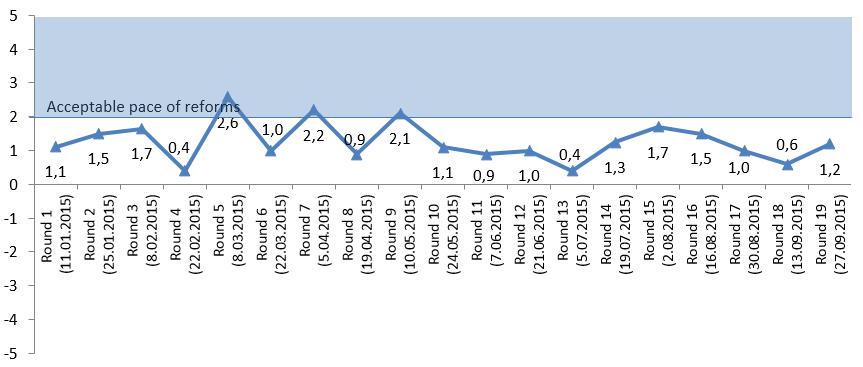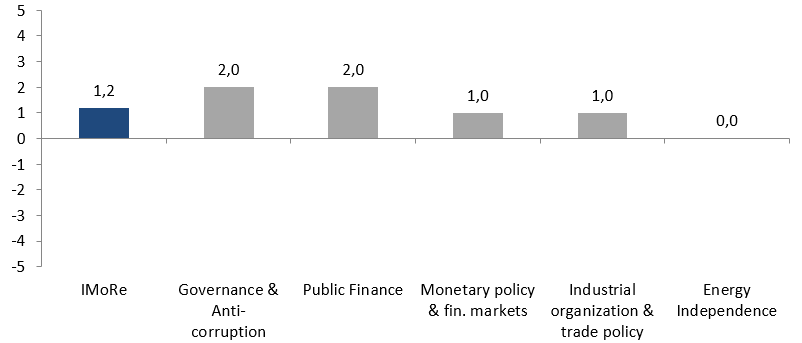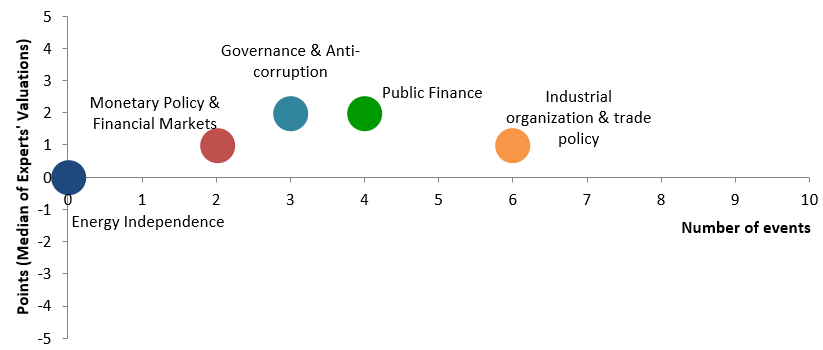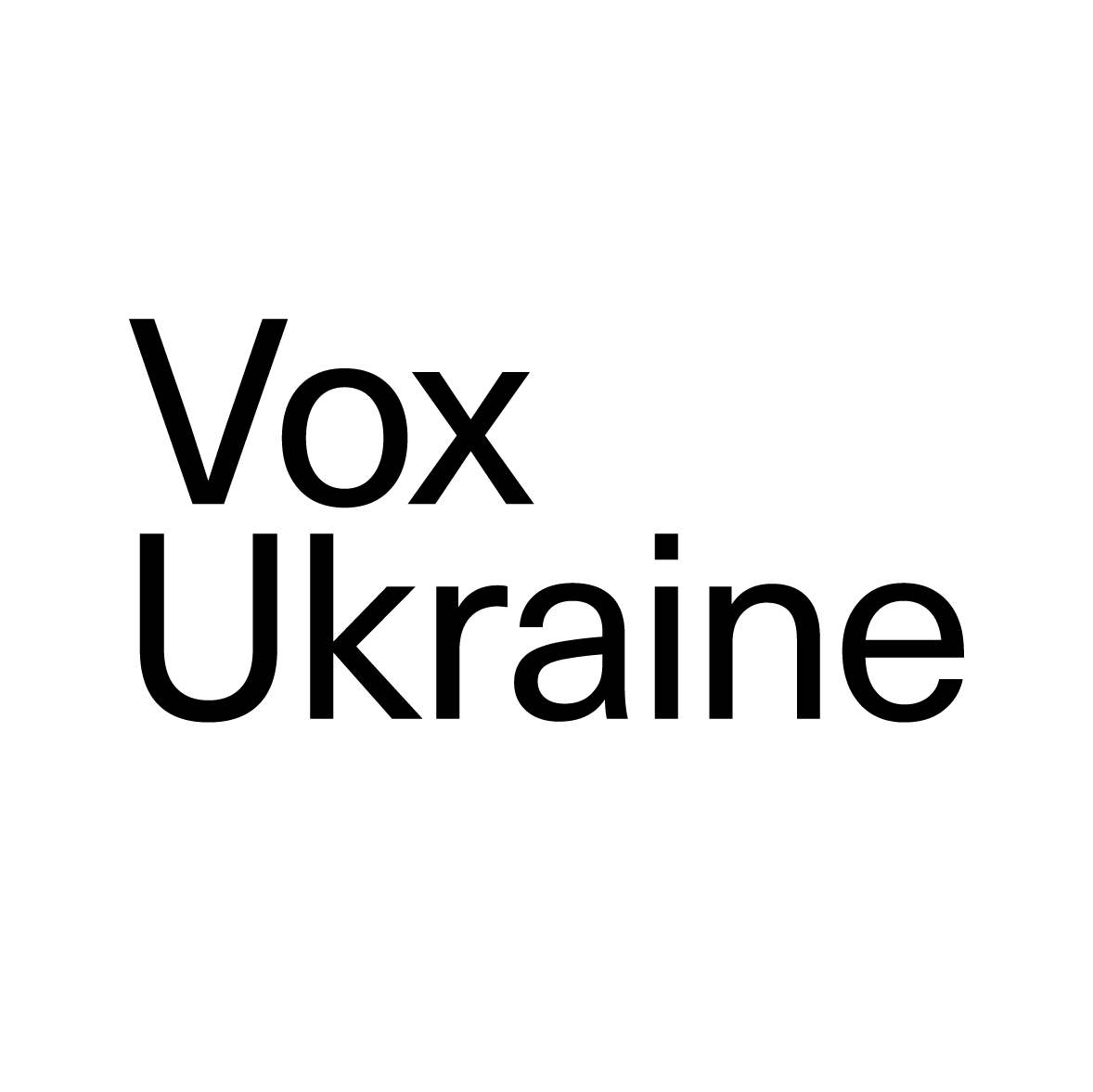Reform Index aims to provide a comprehensive assessment of reform efforts by Ukraine’s authorities. The Index is based on expert assessments of changes in the regulatory environment in five areas. Reform Index value for the 19th monitoring period (September 14th – 27th, 2015) was +1.2 points out of the possible range from -5.0 to +5.0 points.
The highest grades were assigned to improvements in the “Governance and Anti-Corruption” and “Public Finance” sectors, while enactment of the law on public procurement became the most significant event in this survey round.
Chart 1. Reform Index dynamics
Chart 2. Reform Index and its components in the current round
Despite the low index results in the nineteenth period, one of the laws in it has become a “star” and received one of the highest grades since the start of the monitoring in January 2015 (only the decision to increase gas tariffs for population got a higher grade). Namely, the new law on public procurement (679-VIII of 15.09.2015) received +8.5 points as a sum of grades in “Public Finance”, “Anticorruption” and “Foreign Trade” sub-indices (remember that an event grade is the sum of grades it receives under several sub-indices and therefore can be higher than +5.0 points). The new law prescribes the disclosure of information on public tenders, including bids, final beneficiaries of participating companies, evaluation protocol. The law simplifies participation in tenders and promotes competition: the complete package of documents should be submitted only by a potential winner, it is forbidden to require documents which are publicly available, and procurement threshold increased. In addition, the law will allow Ukraine to join the WTO Agreement on Government Procurement which opens access for Ukrainian companies to public procurement markets abroad.
The regulation on tightening requirements for issuers of securities included in the stock exchange register by the National Security Commission (NSSMC) scored second with +3.5 points (the sum of “Financial Markets” and “Corporate Governance” sub-indices, NSSMC decision 1688 of 06.08.2015).
The Order of disclosure of State Treasury payment transactions on the web portal for public funds use (CMU resolution 676 from 14.09.2015) received +2.5 points. This is the final step in launching of an open data web portal for public funds usage (e-data.gov.ua).
Simplification of state-owned enterprises liquidation procedure (law 667-VIII of 03.09.2015) got a total of +2.5 points in “Corporate Governance” and “Public Finance” sub-indices. The law eliminated the collision that arose when a government body that made the decision to liquidate a SOE was liquidated itself. Now state-owned enterprises can be liquidated not only by the state body that made the decision to liquidate them, but also by the body that picked up its functions.
The law on electronic commerce (675-VIII of 03.09.2015) scored +2.0 points, as it creates a legal framework for operation and development of e-commerce. However, some experts believe that the law requires a substantial revision regarding intellectual property rights protection since its current provisions contradict the DCFTA with the EU.
One event in the nineteenth period received a negative assessment. The introduction of single benchmarks for customs value of imported goods (CMU resolution 724 from 16.09.2015) received -1.0 point. According to experts, single benchmarks themselves are a positive thing, the main problem is how and for which purpose they are used. Today, when the State Fiscal Service is not reformed and the fight against corruption at the border is lost, implementation of this development has led to increased queues at the border and deteriorating terms of trade. As academic director at the Institute for Economic Research and Policy Consulting Veronika Movchan notes,
The main question is adequacy of application of this customs valuation method. Single benchmarks are useful provided that the evaluation method based on them is an exception rather than the rule.
In general, experts estimated Governance and Anti-Corruption sector progress at +2.0 points. The same grade was assigned to Public Finance sub-index. Monetary Policy and Financial Markets, as well as Industrial organization and Trade Policy sectors received +1.0 point each. Without any notable events, Energy independence sector scored 0.0 points.
Reform Index aims to provide a comprehensive assessment of reform efforts by Ukraine’s authorities. The Index is based on expert assessments of changes in the regulatory environment in five areas:
- Governance and Anti-Corruption
- Public Finance and Labor Market
- Monetary Policy and Financial Markets
- Industrial Organization and Foreign Trade
- Energy Independence
For details please visit reforms.voxukraine.org
Chart 3. Value of Reform Index components and number of events September 14 – 27, 2015
Main media partner Project partners

Attention
The authors do not work for, consult to, own shares in or receive funding from any company or organization that would benefit from this article, and have no relevant affiliations




